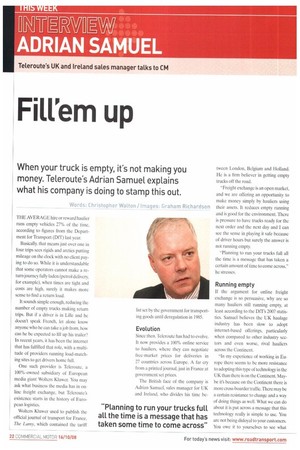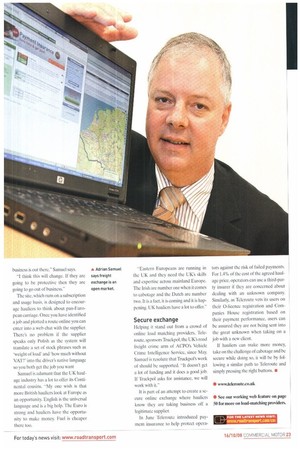Filrem up
Page 22

Page 23

If you've noticed an error in this article please click here to report it so we can fix it.
When your truck is empty, it's not making you money. Teleroute's Adrian Samuel explains what his company is doing to stamp this out.
Woros: Lnristopner Walton I Images: &ranam Richardson
THE AVERAGE hire or reward haulier runs empty vehicles 27% of the time, according to figures from the Department for Transport (DfT) last year.
Basically, that means just over one in four trips sees rigids and arctics putting mileage on the clock with no client paying to do so. While it is understandable that some operators cannot make a return journey fully laden (petrol delivery, for example), when times are tight and costs are high, surely it makes more sense to find a return load.
It sounds simple enough, reducing the number of empty trucks making return trips. But if a driver is in Lille and he doesn't speak French, let alone know anyone who he can take a job from, how can he be expected to fill up his trailer? In recent years, it has been the internet that has fulfilled that role, with a multitude of providers running load-matching sites to get drivers home full.
One such provider is Teleroute. a 100%-owned subsidiary of European media giant Wolters Kluwer. You may ask what business the media has in online freight exchange, but Teleroute's existence starts in the history of European logistics.
Wolters Kluwer used to publish the official journal of transport for France. L The Lamy, which contained the tariff list set by the government for transporting goods until deregulation in 198.5.
Evolution
Since then, leleroute has had to evolve. It now provides a 100% online service to hauliers. where they can negotiate free-market prices for deliveries in 27 countries across Europe. A far cry from a printed journal, just in France at government set prices.
The British face of the company is Adrian Samuel, sales manager for UK and Ireland, who divides his time be tween London, Belgium and Holland. He is a firm believer in getting empty trucks off the road.
"Freight exchange is an open market, and we are offering an opportunity to make money simply by hauliers using their assets. It reduces empty running and is good for the environment. There is pressure to have trucks ready for the next order and the next day and I can see the sense in playing it safe because of driver hours but surely the answer is not running empty.
"Planning to run your trucks full all the time is a message that has taken a certain amount of time to come across," he stresses.
Running empty
If the argument for online freight exchange is so persuasive, why are so many hauliers still running empty, at least according to the DIT's 2007 statistics. Samuel believes the UK haulage industry has been slow to adopt internet-based offerings, particularly when compared to other industry sectors and even worse, rival hauliers across the Continent.
"In my experience of working in Europe there seems to be more resistance to adopting this type of technology in the UK than there is on the Continent. Maybe it's because on the Continent there is more cross-boarder traffic. There may be a certain resistance to change and a way of doing things as well. What we can do about it is put across a message that this technology really is simple to use. You are not being disloyal to your customers. You owe it to yourselves to see what business is out there," Samuel says.
"I think this will change. If they are going to be protective then they are going to go out of business.
The site, which runs on a subscription and usage basis, is designed to encourage hauliers to think about pan-European carriage. Once you have identified a job and plotted a route online you can enter into a web chat with the supplier. There's no problem if the supplier speaks only Polish as the system will translate a set of stock phrases such as 'weight of load' and 'how much without VAT?' into the driver's native language so you both get the job you want Samuel is adamant that the UK haulage industry has a lot to offer its Continental cousins. "My one wish is that more British hauliers look at Europe as an opportunity. English is the universal language and is a big help. The Euro is strong and hauliers have the opportunity to make money. Fuel is cheaper there too. "Eastern Europeans are running in the UK and they need the UK's skills and expertise across mainland Europe. The Irish are number one when it comes to cabotage and the Dutch are number two. It is a fact, it is coming and it is happening. UK hauliers have a lot to offer."
Secure exchange
Helping it stand out from a crowd of online load matching providers, Teleroute, sponsors Truckpol, the UK's road freight crime arm of ACPO's Vehicle Crime Intelligence Service, since May. Samuel is resolute that Truckpol's work of should be supported. It doesn't get a lot of funding and it does a good job. If Truckpol asks for assistance, we will work with it."
It is part of an attempt to create a secure online exchange where hauliers know they are taking business off a legitimate supplier.
In June Teleroute introduced payment insurance to help protect opera tors against the risk of failed payments. For 1.4% of the cost of the agreed haulage price, operators can use a third-party insurer if they are concerned about dealing with an unknown company. Similarly, as Teleroute vets its users on their 0-licence registration and Companies House registration based on their payment performance, users can be assured they are not being sent into the great unknown when taking on a job with a new client.
ff hauliers can make more money, take on the challenge of cabotage and be secure while doing so, it will be by following a similar path to Teleroute and simply pressing the right buttons. • • www.teleroute.co.uk • See our working web feature on page 50 for more on load-matching providers.
















































































































































































